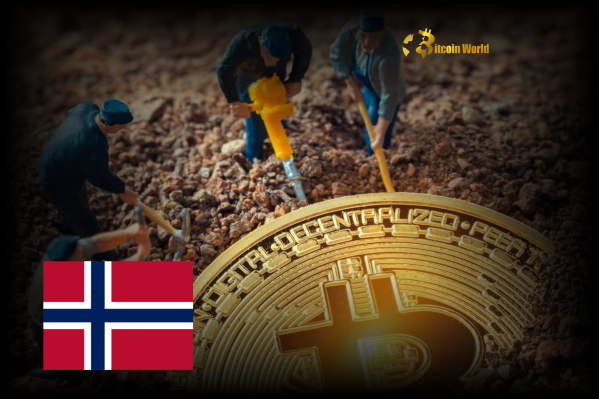Norway Crypto Mining Faces Temporary Ban: Why Energy Consumption is Key
0
0
BitcoinWorld

Norway Crypto Mining Faces Temporary Ban: Why Energy Consumption is Key
Get ready for a significant development impacting the world of digital asset creation. The Norwegian government is signaling a major shift in its energy policy concerning cryptocurrency operations. Specifically, they are planning a temporary ban on the construction of new, high-energy crypto mining data centers. This move, reported by Odaily based on local sources, underscores a growing global tension between the energy demands of certain industries and the needs of the broader economy.
Why is Norway Targeting Crypto Mining Data Centers?
Norway, a nation known for its abundant hydropower, is taking this step primarily to reallocate precious electricity resources. The core reason behind the proposed ban is the high energy consumption associated with cryptocurrency mining, particularly for proof-of-work coins like Bitcoin. While mining operations consume significant amounts of power, the government reportedly views their local economic impact as minimal compared to other industries vying for the same energy supply.
Think about it: Industries like manufacturing, traditional data centers supporting essential services, or even residential heating all require reliable and affordable electricity. As demand grows, prioritizing which sectors get access becomes crucial. Norway’s government seems to be making a clear choice here.
What Does This Temporary Ban Entail?
The proposed measure isn’t an immediate shutdown of existing facilities, but rather a pause on expansion. Here’s what we know:
- What: A ban on the construction of *new* data centers specifically intended for high-energy cryptocurrency mining.
- When: The ban is expected to come into effect in the fall of 2025. This gives the industry some lead time, but also sets a firm deadline for any planned new developments.
- Why: To limit the overall energy consumption of this specific industry and ensure sufficient electricity is available for sectors deemed to have greater local economic benefit.
This focus on crypto mining data centers highlights the government’s view that while cryptocurrency might be a global phenomenon, the energy-intensive process of creating it within Norway’s borders doesn’t provide enough tangible benefits back to the local community or economy to justify its power demands, especially when other industries are energy-starved.
The Broader Implications: Energy Consumption and the Future of Mining
This decision by Norway adds to a growing list of countries and regions scrutinizing the energy consumption of crypto mining. We’ve seen similar discussions, regulations, and even outright bans in places like China and various US states. The narrative is consistent: the environmental and grid strain caused by massive power usage for mining is becoming a significant point of contention.
For the crypto mining industry, this poses a challenge. It forces miners to consider locations with more favorable energy policies, potentially shifting operations to regions with surplus renewable energy or less stringent regulations. It also accelerates the debate around more energy-efficient consensus mechanisms, such as Proof-of-Stake, which require vastly less electricity.
What’s Next for Norway Crypto Mining?
While existing facilities may continue operating (for now), the door is closing on new large-scale expansions specifically for high-energy mining. The temporary ban signals that Norway is serious about managing its power grid and prioritizing energy use based on perceived economic and societal benefit. The duration of the ban remains ‘temporary,’ but the criteria for lifting it would likely involve a change in energy availability, a shift in the economic impact of mining, or perhaps technological advancements that drastically reduce energy consumption.
For investors and operators in the space, Norway’s decision serves as a stark reminder that regulatory and energy-related risks are significant factors when considering mining operations globally. Access to affordable and sustainable electricity is not guaranteed and can be subject to sudden policy changes.
In Conclusion: A Critical Juncture for Energy and Digital Assets
Norway’s planned temporary ban on new crypto mining data centers from Fall 2025 is a pivotal moment, emphasizing the global debate around the energy consumption of digital asset creation. By prioritizing its valuable electricity resources for industries deemed more beneficial to the local economy, Norway joins a growing trend of nations grappling with the power demands of mining. This move highlights the need for the crypto industry to continue innovating towards more sustainable practices and for operators to carefully evaluate the regulatory and energy landscape of potential locations. The future of Norway crypto mining, at least in terms of expansion, is now clearly linked to the nation’s strategic energy priorities.
To learn more about the latest crypto market trends, explore our article on key developments shaping Bitcoin institutional adoption.
This post Norway Crypto Mining Faces Temporary Ban: Why Energy Consumption is Key first appeared on BitcoinWorld and is written by Editorial Team
0
0
 Manage all your crypto, NFT and DeFi from one place
Manage all your crypto, NFT and DeFi from one placeSecurely connect the portfolio you’re using to start.




